Public attitudes towards people with drug dependence and people in recovery: research report
Research into public attitudes in Scotland towards people with a history of drug dependence.
Research Findings
Personal experience of drug use and drug dependence
The survey explored personal experience of both recreational drug use and drug dependence. Respondents were asked whether they knew anybody who has ever used drugs recreationally (defined as taking drugs occasionally, e.g. at a party), and whether they knew anybody who has ever had some kind of dependence on drugs (defined as an overwhelming need to use illegal drugs such as cocaine, heroin and cannabis).
As shown in Figure 1, one fifth of respondents reported that they had ever used recreational drugs themselves. Four in ten respondents (41%) had a friend who had used drugs recreationally, while 35% reported an acquaintance, and 29% mentioned a work colleague. Overall, just under a third (31%) reported not knowing anyone who had used drugs recreationally.
The figures were lower when respondents were asked about people they knew who had experienced drug dependence. Only a very small minority (3%) had experience of this themselves, while roughly one in ten knew someone through their wider family (9%), through work (9%), a friend (13%) or an acquaintance (13%) who was affected. However, the majority (60%) had no experience in relation to drug dependence.
Figure 1: Experience of drug use and drug dependence
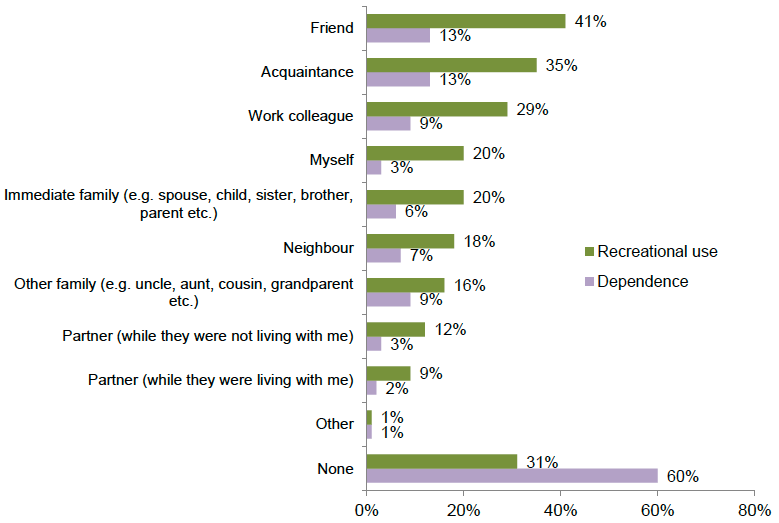
Base (All excluding 'prefer not to say'): Q3 1034, Q4 1041
In order to explore how personal experience may influence attitudes towards drug dependence and recovery, respondents were grouped into the following categories for analysis purposes:
- Respondents with personal experience for each of these questions on recreational drug use and drug dependence, i.e. those who selected 'myself' in answer to this question. These respondents may also have selected other options at this question, but the key criteria was that they had personal experience.
- Those with other experience only, i.e. they selected any other option(s) but not 'myself'.
- Those with no experience, i.e. selecting 'not applicable - I don't know anyone who has used recreational drugs / has had some kind of drug dependence on drugs'.
Figure 2 shows how the sample was split when these definitions were applied. As shown here, 20% had personal experience of recreational drug use, 50% had other experience only, while 31% had no experience. In relation to drug dependence, 3% had personal experience, 37% had other experience only, while the majority (60%) had no experience.
Figure 2: Experience of recreational drug use and drug dependence - analysis categories
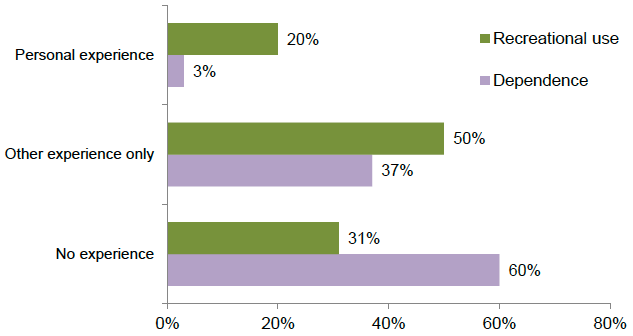
Base (All excluding 'prefer not to say'): Q3 1034, Q4 1041
Throughout this report, analysis highlights where there were differences in attitudes towards drug dependence based on personal experience. This analysis is based on the sub-groups identified above.
Experience of recreational drug use: demographic analysis
Gender
Men were more likely than women to report personally having taken drugs recreationally (men 25%, women 15%), or to mention a friend (men 46%, women 36%), work colleague (men 33%, women 25%) or acquaintance (men 38%, women 32%) having taken drugs recreationally. Women were more likely than men to mention a partner not living with them (women 15%, men 9%) who has taken drugs recreationally.
Age
Experience also varied by age, with the oldest age group (55+) being the least likely to mention any kind of personal experience in relation to recreational drug use: 45% of the 55+ group said they had no experience at all, compared to 29% of 45-54 year olds, 21% of 18-24 and 25-34 year olds, and just 15% of those aged 35-44 years old. Only 8% of the oldest age group (55+) had taken drugs recreationally themselves. Across the other age groups the proportion who had ever taken recreational drugs themselves were broadly similar - 18-24 (27%), 25-34 (32%), 35-44 (28%), 45-54 (24%).
Socio-economic group
There were very few differences in personal experience between socio-economic groups, with AB C1s and C2 DEs being equally likely to have taken drugs recreationally themselves ( AB C1 21%, C2 DE 19%). Those in the C2 DE group were more likely than AB C1s to mention a friend ( C2 DE 44% compared to AB C1 37%), neighbour (21%, 14%) or wider family member (19%, 11%).
Experience of drug dependence: demographic analysis
Gender
Women were more likely than men to mention immediate family (women 8%, compared to men 3%) or a partner not living with them (women 5%, men 2%) who have experience of drug dependence. Men were more likely than women to report knowing a friend who had experience of drug dependence (men 15%, women 10%). There was no difference in terms of gender in the proportions who had personal experience of drug dependence or who had no experience of drug dependence.
Age
The oldest age group were less likely than any other to report having personal experience of drug dependence (0% compared to 6% of 18-24s, 5% of 25-34s, and 4% of 35-44s and 45-54s).
The 25-34 age group (13%) was more likely than any other age group to report a partner (not living with them) had issues with drug dependence, while those in the 35-44 age group were more likely than nearly every other age group (apart from 45‑54s) to mention a colleague (15%).
Socio-economic group
Again, there were very few differences in personal experience between socio-economic groups, with AB C1s and C2 DEs being equally likely to have experienced drug dependence themselves. Those in the C2 DE group were more likely than AB C1s to mention a friend ( C2 DE 15%, AB C1 10%), neighbour ( C2 DE 9%, AB C1 5%) or wider family member ( C2 DE 12%, AB C1 5%).
Blame and intolerance of people with drug dependence
The five attitude statements demonstrating blame and intolerance relate to a belief that people with a history of drug dependence are to blame for their situation, and indicate a negative attitude to those who experience drug dependence. The statements falling into this category are:
- One of the main causes of drug dependence is a lack of self-discipline and willpower.
- There is something about people with drug dependence that makes it easy to tell them from other people.
- If people with drug dependence really wanted to stop using they could do so.
- Increased spending on services for people trying to overcome drug dependence would be a waste of money.
- People with drug dependence don't deserve our sympathy.
Figure 3: Blame and intolerance statements
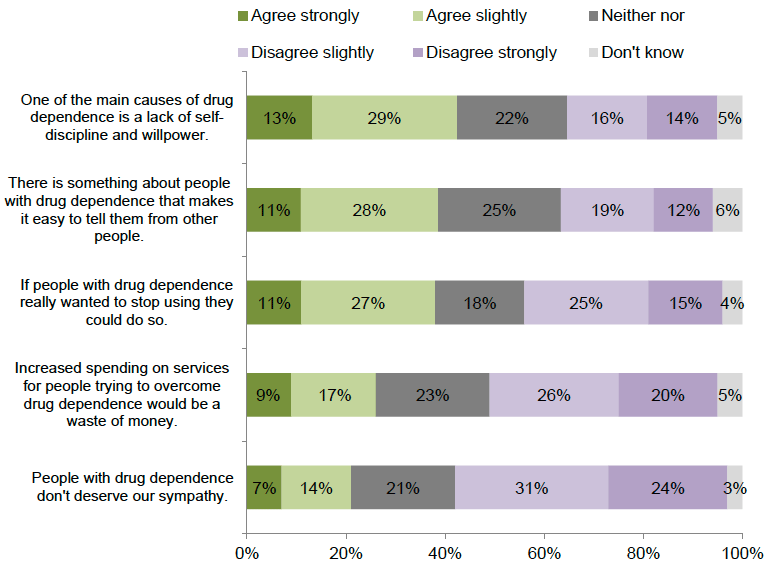
Q1 Base (All): 1089
The data suggest that sizable minorities within the sample felt that a drug dependent person's own lack of willpower contributes to their situation. Forty-two percent of respondents agreed that a lack of self-discipline and willpower was a main cause of drug dependence, and 37% agreed that if drug dependent individuals really wanted to stop using, they would be able to.
However, the idea that increased spending on helping people overcome drug dependence was a waste of money was less prevalent, with only 26% agreeing. Almost half (46%) of the sample disagreed with this statement. This suggests that whilst personal agency was seen as a contributing factor in dependence by many, drug dependent individuals are not perceived as unworthy of public support. This is confirmed by the lack of support for the statement 'people with drug dependence don't deserve our sympathy', with which only one fifth (21%) of the sample agreed and over half (55%) disagreed.
A significant proportion of respondents believe that people who are dependent on drugs are easily identifiable by the way that they look; 38% agreed that those with a dependence on drugs were easy to tell from other people .
Demographic analysis
Age
The 18-24 year old age group (24%) were less likely than the 45-54 year old group (43%) and 55+ (40%) groups to agree that those with a history of drug dependence could stop using if they really wanted.
The 18-24 year old cohort was also less likely than 45-54s and those aged 55+ to regard increased spending on overcoming drug dependence as a waste of money (18-24 13%, 45-54 33%, 55+ 31%) and also less likely than older respondents to feel that those with a drug dependence do not deserve sympathy (18-24 11%, 25-34 25%, 45-54 26%, 55+ 22%).
Gender
Men (50%) were more likely than women (34%) to agree that a lack of self-discipline and willpower was a main factor in drug dependence. Women (45%) were also more likely than men (36%) to disagree with the statement 'If people with drug dependence really wanted to stop using they could do so'.
Men (26%) were more likely than women (15%) to feel that those with a drug dependence were undeserving of sympathy.
Socio-economic group
People from the AB C1 socio-economic groups tended to be more positive towards people with drug dependence than those in the C2 DE groupings:
- One of the main causes of drug dependence is a lack of self-discipline and willpower - C2 DE 47% agreed, AB C1 36% agreed
- If people with a drug dependence really wanted to stop using they could do so - AB C1 47% disagreed, C2 DE 36% disagreed
- Increased spending on services for people trying to overcome drug dependence would be a waste of money - C2 DE 30% agreed, AB C1 22% agreed
- There is something about people with drug dependence that makes it easy to tell them from other people - C2 DE 43% agreed, AB C1 32% agreed
- People with drug dependence do not deserve our sympathy - C2 DE 25% agree, AB C1 16% agree.
Experience
In general, respondents with personal experience of recreational drug use were less likely to agree with each of these statements than other respondents. For example, 35% of those who had used drugs recreationally agreed that one of the main causes of drug dependence is lack of willpower, compared to 47% of those who had no experience of recreational drugs. They were also less likely to agree that you can tell people with drug dependence from other people (24% agreed, significantly lower than among those with other experience, 44%, and those with no experience, 39%), or that people with drug dependence don't deserve our sympathy (12% agreed, compared with 22% who had other experience and 26% with no experience).
There were similar (although not as stark) differences based on personal experience or knowledge of people with a history of drug dependence. While the number of those with personal experience of drug dependence was too small to detect significant differences, those who had other experience (i.e. knew someone with a history of drug dependence) were more likely than those with no experience at all to disagree that there is something different about people with drug dependence, or that a main cause of drug dependence is lack of will power (other experience 37% disagreed, no experience 28%, for both statements).
Sympathy and care towards people with drug dependence
The following attitude statements, in contrast to the first category relating to intolerance and blame, indicate attitudes of sympathy and care, including a sense of responsibility for caring for people with a history of drug dependence. These statements (see Figure 4) are as follows:
- Drug dependence is an illness like any other long-term chronic health problem.
- People with a history of drug dependence are too often demonised in the media.
- We have a responsibility to provide the best possible care for people with drug dependence.
- Drug dependence is often caused by traumatic experiences, such as abuse, poverty and bereavement.
- We need to adopt a far more tolerant attitude towards people with a history of drug dependence in our society.
- People with a history of drug dependence are far less of a danger than most people think.
Figure 4: Sympathy and care statements
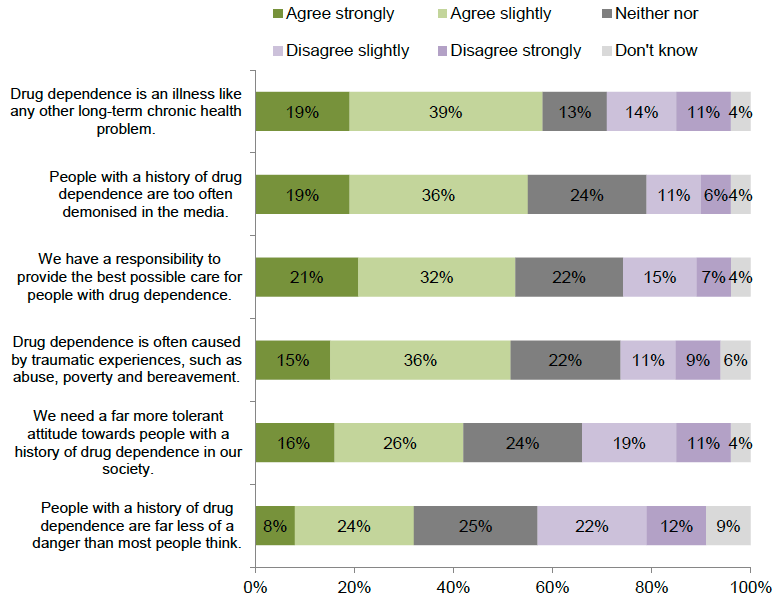
Q1, Base (All): 1089
Overall, relatively strong feelings of sympathy and care were expressed in the survey, with more people agreeing than disagreeing with almost every statement. Just over half of respondents agreed that drug dependence is an illness (58% agreed), people with a history of drug dependence are too often demonised in the media (55%) and that we have a responsibility to care for people with drug dependence (53%).
Lower levels of agreement were evident in relation to the need to adopt a more tolerant attitude towards people with a history of drug dependence in our society (42% agreed). Respondents were less sure in their opinions in relation to the final statement, that people with a history of drug dependence are less of a danger than most people think: views were split here, with 32% agreeing, 34% disagreeing and the remainder split between 'neither/nor' or 'don't know'.
Demographic analysis
Age
While there was not a clear linear pattern in responses across the age groups, younger respondents tended to be more sympathetic towards those with issues of drug dependence than older age groups. For example, 18-24 year olds were more likely to agree drug dependence is an illness (71% agreed). The younger age groups were also more likely to agree that those affected are demonised in the media; 67% of 18-24s and 69% of 25-34s agreed, compared to 47% of those aged 55+.
The older age groups, meanwhile, were less likely than others to agree that we should adopt a more tolerant attitude to this issue (18-24 57%, 25-34 55%, 35-44 47%, significantly higher than 45-54 33% and 55+ 34%), or that those with a history of drug dependence are less of a danger than people think (18-24 46%, 25-34 41%, 35-44 38%, compared to 45-54 26% and 55+ 25%).
Gender
Women were generally more sympathetic towards those with a history of drug dependence than men. For example, women were more likely than men to agree that drug dependence is an illness (women 62%, men 54%), and that drug dependence is often caused by traumatic experiences (56%, 44%). Men were more likely than women to disagree that those with drug dependence are demonised in the media (men 22%, women 12%), we have a responsibility to care for people with drug dependence (27%, 17%) or that people with a history of drug dependence are less of a danger than most people think (39%, 29%).
Socio-economic group
Respondents from the higher AB C1 socio-economic groups were generally more sympathetic than those from the C2DE group, although the difference was less extreme than the differences seen by gender. AB C1s were more likely than C2DEs to agree that drug dependence is an illness ( AB C1 65%, C2DE 53%), people affected are demonised by the media ( AB C1 59%, C2DE 51%), and that the problem is often caused by traumatic experiences such as abuse, poverty or bereavement ( AB C1 56%, C2DE 46%).
Experience
People with personal experience of recreational drug use were significantly more sympathetic than other respondents, with higher proportions agreeing with all of these statements. For example, 81% of these respondents agreed that those with a history of drug dependence were demonised by the media, 73% agreed we have a responsibility to care for those affected by drug dependence, and 71% agreed that drug dependence is an illness comparable to other health problems. The only statement with a different pattern in responses between experience groups was for the statement about traumatic experiences causing drug dependence - in this instance, those with direct or indirect experience of recreational drug use were more likely than those with no experience to agree (personal experience 62% and other experience 54%, compared to no experience 43%).
Again, similar differences emerged based on personal experience or knowledge of drug dependence, with those who had other experience being more likely than those with no experience at all to agree that we have a responsibility to provide the best possible care for those with drug dependence (other experience 59%, no experience 51%), that we need to adopt a more tolerant attitude (other experience 47%, no experience 36%) or that those with a history of drug dependence are less dangerous than people think (42%, 36%).
Fear and exclusion of people with a history of drug dependence
The third group of attitude statements centre around fear of people with a history of drug dependence and their exclusion from society (see Figure 5):
- I would not want to live next door to someone who has been dependent on drugs.
- People with a history of drug dependence are a burden on society.
- Anyone with a history of drug dependence should be excluded from taking public office (e.g. being on the local council).
- A person would be foolish to enter into a serious relationship with a person who has suffered from drug dependence, even if they seemed fully recovered.
- Residents have nothing to fear from people coming into their neighbourhood to obtain drug treatment services.
- Most people who were once dependent on drugs can be trusted as babysitters.
Figure 5: Fear and exclusion statements
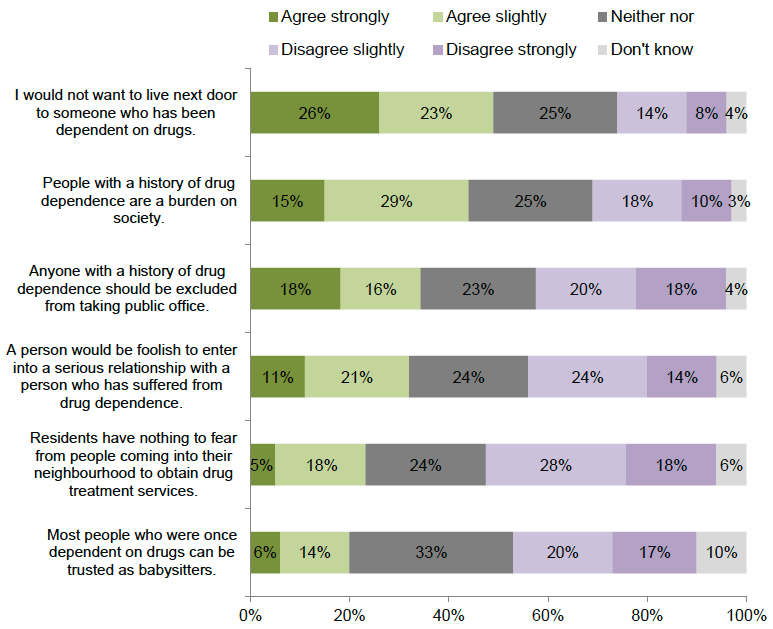
Q1, Base (All): 1089
The data provides evidence of fear in relation to people with a history of drug dependence or those in recovery, with the strongest agreement with the statement about living next door to someone who has been dependent on drugs - half of the sample overall (50%) agreed that they would not want someone like this as a neighbour. A slightly lower proportion (44%) agreed that those with a history of drug dependence are a burden on society.
Around a third of the sample agreed that people with a history of drug dependence should be excluded from taking public office (34%), although a similar proportion disagreed with this statement (39%). Views were similarly split in relation to whether it was foolish to enter into a relationship with someone with a history of drug dependence even if they seemed recovered (32% agreed, 38% disagreed).
A higher proportion disagreed than agreed that residents have nothing to fear from people obtaining drug treatment services in their neighbourhood (46% disagreed; 23% agreed) or that most people with a history of drug dependence could be trusted as babysitters (38% disagreed, 19% agreed, although overall 43% said 'neither/nor' or 'don't know').
Taken together, these findings suggest that, whilst many people have sympathy for people who have experienced drug dependence, a significant minority have concerns about personal contact with such people, either through relationships, being in the same community or allowing them to babysit for children.
Demographic analysis
Age
There was a clear pattern in responses to these statements in that the youngest respondents (18-24 year olds) tended to be the least likely to express feelings of fear and exclusion with regards to people with a history of drug dependence. For example, they were less likely to agree they would not want a neighbour who had a history of drug dependence (29% agreed, significantly lower than 35-54s (46%), 45-54s (54%) and 55+ (59%), although not significantly lower than 25-34s (41%)); that people with a history of drug dependence are a burden on society (16%); they should be excluded from public office (9%); or that it would be foolish to have a relationship with such a person (8%). All of these were significantly lower agreement levels than for any other age group.
The two youngest age groups were also more likely than the three older age groups to agree that people have nothing to fear about people coming into their neighbourhoods for drug treatment (18-24 46% and 25-34 31% compared to 35-44 14%, 45-54 19% and 55+ 19%). The youngest respondents (28% of 18-24s) were also significantly more likely to agree that those who were once dependent on drugs could be trusted as babysitters than the oldest respondents (16% of 55+).
Gender
Men and women were in broad agreement across most of the statements relating to fear and exclusion. The only differences were that men were more likely than women to agree that they would not want to live next door to someone with a history of drug dependence (men 55%, women 45%), or that people affected are a burden on society (men 49%, women 40%).
Socio-economic group
Responses were broadly similar across the two socio-economic groups. The only difference observed was that C2DE respondents were more likely than AB C1s to agree that people with a history of drug dependence should be excluded from public office ( C2DE 38%, AB C1 30%).
Experience
The acceptability of living next door to someone who has been dependent on drugs was strongly related to people's own personal experience of recreational drug use. Two thirds (66%) of those with no personal experience of this would not want to live next door to someone with a history of drug dependence; this fell to half (50%) of those with other experience only, and dropped again to just 28% among those with personal experience of recreational drug use. A similar pattern was observed for all other statements relating to fear and exclusion, indicating that personal experience has a clear effect on the perceived threat of people with a history of drug dependence and people in recovery.
As with previous findings, a similar pattern was evident among those with some experience of drug dependence, with this group being more likely than those with no experience to disagree that they would not want someone who has been dependent on drugs as a neighbour (29% disagreed, compared to 16% of those with no experience), that those with drug dependence are a burden on society (36% compared with 22%) or that it would be foolish to have a relationship with such a person (44% as opposed to 33%).
Acceptance and integration of people with a history of drug dependence
The next group of attitude statements relates to a theme that the UKDPC report described as acceptance and integration. The statements in this group (see Figure 6) were:
- Virtually anyone can become dependent on drugs.
- It is important for people recovering from drug dependence to be part of the community.
- People recovering from drug dependence should have the same rights to a job as anyone else.
- People who become dependent on drugs are basically just bad people.
Figure 6: Acceptance and integration statements
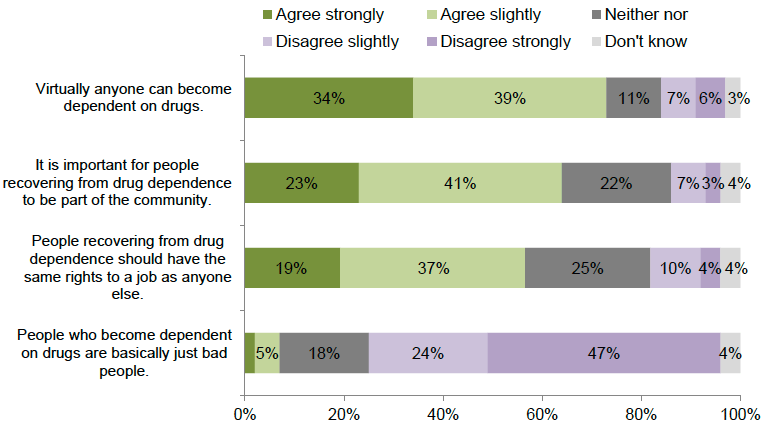
Q1, Base (All): 1089
Despite the evidence of some fear in relation to people who have experienced drug dependence, respondents did also show high levels of agreement with the statements about acceptance and integration, indicating a strong sense that people recovering from drug dependence should be included in the community and a recognition that this kind of issue could affect anyone.
The strongest agreement was evident for the statements that virtually anyone can become dependent on drugs (73% agreed) and that it is important for people recovering from drug dependence to be part of the community (64% agreed). Just under half (47%) agreed that people recovering from drug dependence should have the same rights to a job as anyone else. There was strong disagreement with the assertion that people who become dependent on drugs are basically just bad people (71% disagreed, one of the strongest levels of disagreement observed across all of the 25 statements).
Demographic analysis
Age
There was less of an obvious difference between responses from different age groups to these statements, although the youngest respondents were more likely than those aged 35 or over to agree that it is important for those recovering from drug dependence to be part of the community (79% agreed, significantly higher than 35-44 63%, 45-54 58% and 55+ 62%). They were also more likely than those aged 45+ to agree that people affected have the same rights to a job as anyone else (18-24 69%, significantly higher than 45-54 49% and 55+ 53%).
Gender
Responses were broadly similar across men and women for these statements, with the exception that men were more likely to disagree that people in recovery from drug dependence have the same right to a job as anyone else (18% of men disagreed, compared to 11% of women). Men were also more likely to agree that people who become dependent on drugs are basically just bad people (11% of men agreed, compared to 4% of women).
Socio-economic group
The AB C1 socio-economic group expressed greater levels of acceptance and integration for three of the four statements in this section. AB C1s were more likely than C2DEs to agree that virtually anyone can become drug dependent ( AB C1 78% agreed, C2DE 70%) and people with a history of drug dependence should recover as part of the community ( AB C1 68%, C2DE 61%). AB C1s were also more likely to disagree that people who become dependent on drugs are basically just bad people (77% disagreed, compared to 66% of C2DEs). The only statement for which there was no difference was in relation to people with drug dependence having the same rights to a job as anyone else ( AB C1 60% agreed, C2DE 54% agreed).
Experience
In keeping with previous findings, those with personal experience of recreational drug use were more accepting than those without: agreement that virtually anyone can become drug dependent increased with the level of experience (no experience 66% agreed, other experience 75%, personal experience 88%) and a similar pattern was evident across all other statements.
Those who knew someone with a history of drug dependence were more likely than those with no experience to agree that those recovering from drug dependence had the same rights to a job as anyone else (64% agreed, compared to 52% of those with no experience at all).
Recovery from drug dependence
Two of the statements examine people's beliefs about recovery from drug dependence (see Figure 7):
- People can never completely recover from drug dependence.
- People taking medication like methadone to treat their drug dependence and no longer use illegal drugs, can be considered recovered.
Figure 7: Recovery from drug dependence statements
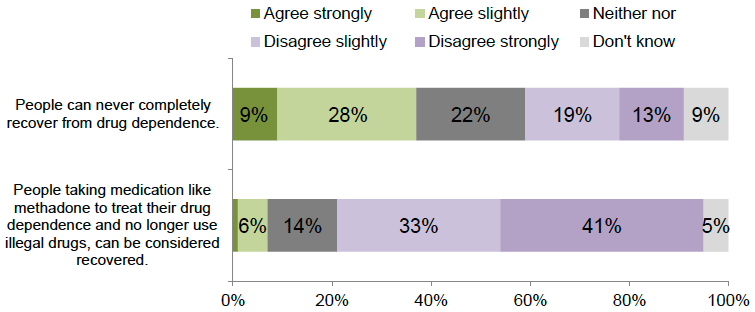
Q1, Base (All): 1089
Just under four in ten respondents (37%) agreed that people can never completely recover from drug dependence, although views were fairly evenly split with a similar proportion (32%) disagreeing. There was strong disagreement that taking medication such as methadone represents recovery from drug dependence, with three quarters (74%) disagreeing. This was the strongest level of disagreement for any of the 25 statements included in the survey.
Demographic analysis
Age
Responses were fairly similar across the age groups in relation to views on whether people could ever recover from drug dependence, with no significant differences between responses. The oldest respondents were most likely to disagree that people using medication such as methadone could be considered to be recovered: 81% of those aged 55+ and 80% of 45-54 year olds disagreed with this statement, compared to 56% of 18‑24s, 67% of 25-34s and 71% of 35-44s.
Gender
There were no differences between men and women in their attitudes towards the statements on recovery from drug dependence.
Socio-economic group
Findings were mixed in relation to socio-economic group: AB C1s were more likely than C2DEs to disagree that people could never recover from drug dependence ( AB C1 37% disagreed, C2DE 28%), but they were also more likely to disagree that methadone use constituted recovery ( AB C1 79%, C2DE 70%).
Experience
Respondents with personal experience of recreational drug use were more likely to disagree that people could never recover from drug dependence than those with indirect or no experience (51% disagreed, compared to 30% of those with other experience and 26% of those with no experience).
There were no differences in views of recovery based on personal experience of drug dependence.
Attitudes towards family members of people with drug dependence
The final two statements aim to identify the extent of stigma towards family members of people with drug dependence, and are as follows (see Figure 8):
- Parents would be foolish to let their children play in the park with children of someone who has a history of drug dependence.
- Most people would not become dependent on drugs if they had good parents.
Figure 8: Attitudes towards family members statements
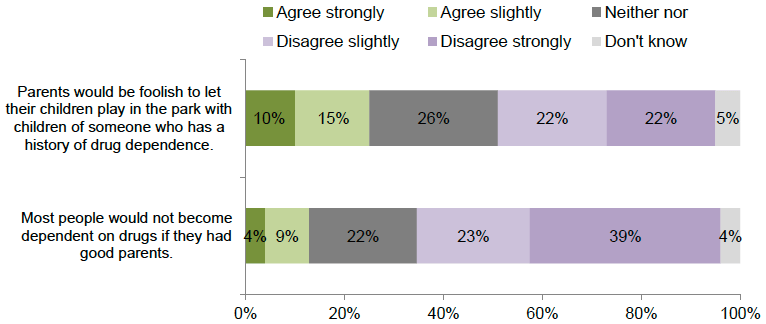
Q1, Base (All): 1089
There were generally low levels of agreement with these statements about stigma in relation to family members. Just over one in ten respondents (12%) agreed that most people would not become drug dependent if they had good parents, and around a quarter (26%) agreed that parents should not let their children play with the children of someone with a history of drug dependence. Although levels of agreement with these statements were lower than for some of the other statements specifically about people with a history of drug dependence, these findings do suggest that to some extent the stigma affects family members as well as the individual.
Any stigma associated with drug dependence therefore appears to be largely limited to the individual themselves, rather than to the family members of those affected.
Demographic analysis
Age
The oldest age group (31% of 55+) were more likely than the youngest (15% of 18-24s) to agree that it would be foolish for parents to let their children play with the children of those with a history of drug dependence. However, older respondents tended to be more likely to disagree that good parenting is an influence on drug dependence, although the pattern was less clear cut (65% of 55+ disagreed with this statement, significantly higher than 35-44s, 53%).
Gender
Women were more likely than men to disagree with both of these statements relating to family influences: two thirds of women (67%) disagreed that people would not become drug dependent if they had good parents (compared to 56% of men), while almost half of the female respondents (48%) disagreed it would be foolish for parents to let their children to play with the children of people with people with a history of drug dependence (compared to 40% of men).
Socio-economic group
There were no differences in responses to these questions by socio-economic group.
Experience
Again, a clear pattern emerged in responses to these statements based on respondents' own experiences in relation to recreational drug use. For example, people with no experience were the most likely to agree that parents would be foolish for letting their children play with the children of people with a history of drug dependence (38% agreed), significantly higher than those with indirect experience (25%), which was significantly higher than those with personal experience (13%). Similarly, those with no experience were less likely to disagree than those with any experience of recreational drugs that parenting is an influence on drug dependence (51% disagreed, compared to 73% of those with personal experience and 65% of those with other indirect experience).
People with some experience of drug dependence were also more likely to disagree with both of these statements than those with no experience. Those with the most direct experience of either recreational drug use or drug dependence, therefore, are less likely to demonstrate stigma towards the family members of people with a history of drug dependence.
Perceived acceptability of different types of drug use
In order to explore whether the general public holds different views of drug use depending on the type of drug, the survey asked how acceptable respondents considered the following types of drug use to be:
- Smoking cannabis a few times a week
- Using methadone [5] for 10 years or more
- Using 'party drugs' (e.g. ecstasy/other illegal stimulants) at the weekend
- Using heroin on a daily basis for six months
- Using cocaine every day
- Using heroin on a daily basis for 10 years or more.
Respondents were asked to rate each of these types of drug use on a scale of 1 to 10, where 1 is 'very acceptable' and 10 is 'not at all acceptable'. Figure 9 outlines the proportion of people giving each score, and Table 3 presents the mean score for each type of drug use.
Figure 9: Perceived acceptability of different types of drug use
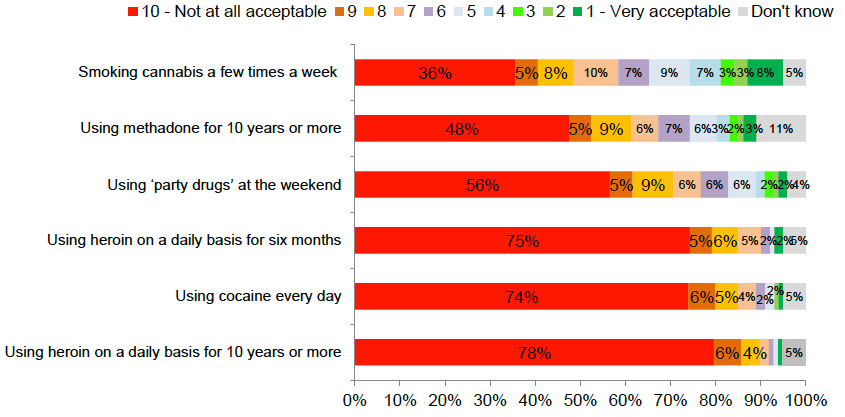
Q2, Base (All): 1089
Table 3: Perceived acceptability of different types of drug use (mean scores)
| Type of drug use | Mean score |
|---|---|
| Smoking cannabis a few times a week | 7.10 |
| Using methadone for 10 years or more | 8.19 |
| Using 'party drugs' (e.g. ecstasy, other illegal stimulants etc.) at the weekend | 8.39 |
| Using heroin on a daily basis for six months | 9.33 |
| Using cocaine every day | 9.33 |
| Using heroin on a daily basis for 10 years or more | 9.48 |
Q2, Base (All): 1089
All six of the types of drug use were judged to be unacceptable, with mean scores ranging from 7.10 to 9.48, where 1 is very acceptable and 10 is not at all acceptable.
Using heroin daily for ten or more years was seen as the least acceptable type of drug use, with almost eight in ten (78%) respondents scoring this the maximum '10' (not at all acceptable); mean score 9.48.
Both using heroin daily for six months (75%) and using cocaine every day (74%) were seen as '10' (not at all acceptable) by three quarters of respondents; mean score 9.33 for each.
The use of party drugs was deemed not at all acceptable by just over half of those sampled (56%); mean score 8.39. Using methadone for ten years or more was viewed as not at all acceptable by just under half of respondents (48%); mean score 8.19.
Smoking cannabis a few times a week received the least negative reaction of the six types of drug use, with a little over a third of the sample (36%) describing it as not at all acceptable; mean score 7.10. Indeed, 13% of respondents rated the acceptability of using cannabis as 1, 2 or 3, indicating that they find this type of drug usage acceptable.
Demographic analysis
Age
As shown in Table 4, those in the eldest two age bands (45-54 and 55+) were consistently more likely than the youngest two bands (18-24 and 25-34) to consider each scenario less acceptable. The figures in the table illustrate the mean score out of 10, and the proportion of respondents in each group who gave a score of 10 (i.e. 'not at all acceptable').
Table 4: Perceived acceptability of different types of drug use by age group
| Mean scores (% scoring '10') | Age groups | |||
|---|---|---|---|---|
| Type of drug use | 18-24 | 25-34 | 45-54 | 55+ |
| Using 'party drugs' (e.g. ecstasy, other illegal stimulants etc.) at the weekend | 7.20 (35%) | 7.89 (51%) | 8.73 (61%) | 9.14 (68%) |
| Using heroin on a daily basis for six months | 9.03 (62%) | 8.87 (67%) | 9.60 (80%) | 9.53 (81%) |
| Smoking cannabis a few times a week | 5.96 (25%) | 6.61 (30%) | 7.48 (43%) | 7.85 (42%) |
| Using heroin on a daily basis for 10 years or more | 9.17 (68%) | 9.15 (73%) | 9.71 (84%) | 9.64 (83%) |
| Using cocaine everyday | 8.89 (58%) | 8.98 ( 70%*) | 9.54 (78%) | 9.59 (83%) |
| Using methadone for 10 years or more | 7.00 (27%) | 7.48 (39%) | 8.75 (58%) | 8.48 (53%) |
*not statistically significant
Gender
Women were less likely than men to consider drug usage as acceptable, for example using party drugs at weekends (women 8.86, men 7.87), smoking cannabis a few times a week (women 7.55, men 6.59) and using cocaine daily (women 9.47, men 9.19).
Women (81%) were also more likely than men (75%) to score using heroin daily for ten or more years as not at all acceptable. However, their mean scores were not significantly different for this type of drug use.
Socio-economic group
Similarly, those from a higher socio-economic background were also more likely to consider using drugs as unacceptable, compared to those from the C2DE groups. In particular, AB C1 respondents were more against using party drugs at weekends ( AB C1 8.70, C2DE 8.13), smoking cannabis a few times a week ( AB C1 7.39, C2DE 6.85) and using cocaine daily ( AB C1 9.53, C2DE 9.17).
Whilst the mean score difference was not statistically significant regarding the use of heroin daily for ten or more years, AB C1 respondents (81%) were more likely than C2DE respondents (75%) to select a score of 10 meaning that they consider this type of drug use to be not at all acceptable.
Experience
Perhaps unsurprisingly, those with personal experience of recreational drug use were more likely to consider drug use as acceptable than those with only non-personal experience and those with no experience at all of recreational drug use (see Table 5).
Table 5: Perceived acceptability of different types of drug use by experience of recreational drug use
| Recreational use (mean scores) | |||
|---|---|---|---|
| Statement | Personal experience | Other experience only | No experience |
| Using 'party drugs' (e.g. ecstasy, other illegal stimulants etc.) at the weekend | 6.03 | 8.76 | 9.35 |
| Using heroin on a daily basis for six months | 8.79 | 9.42 | 9.59 |
| Smoking cannabis a few times a week | 4.24 | 7.44 | 8.57 |
| Using heroin on a daily basis for 10 years or more | 9.03 | 9.55 | 9.71 |
| Using cocaine everyday | 8.54 | 9.49 | 9.60 |
| Using methadone for 10 years or more | 7.36 | 8.14 | 8.88 |
While the low base size of those with personal experience of drug dependence prevents robust comparison, the data indicates that this group was more accepting across all six stated situations than those with only an non-personal experience of drug dependence or no experience at all.
Contact
There is a problem
Thanks for your feedback